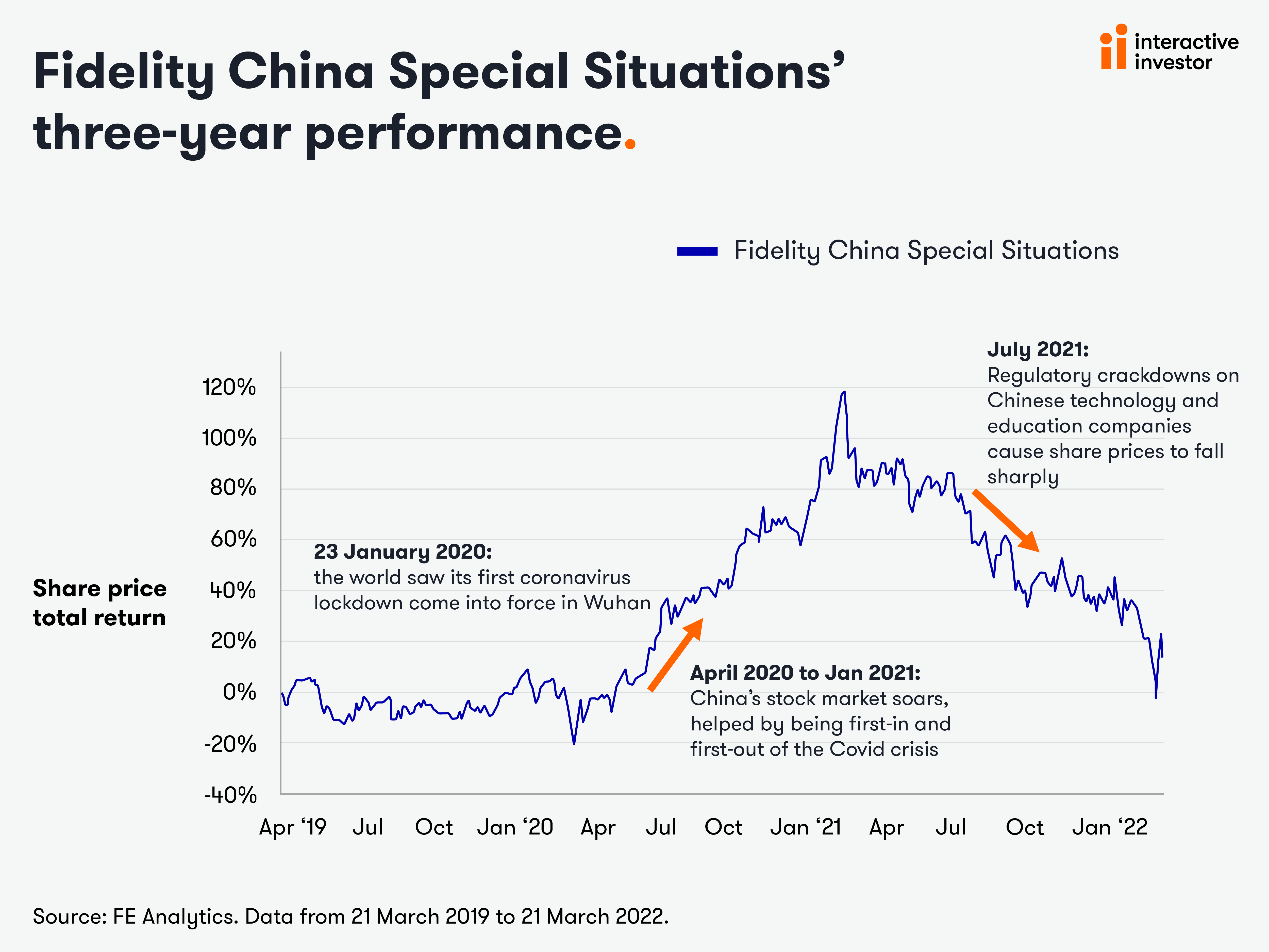Fidelity China trust underperforms, but wins board backing
31st May 2022 12:36
by Sam Benstead from interactive investor
The trust has beaten its benchmark over three years but has lagged it over the past 12 months.

The board of Fidelity China Special Situations has pledged its support for fund manager Dale Nicholls, following its year of underperformance relative to its benchmark.
Released today, the trust’s annual report showed a 34.9% drop in its net asset value (NAV) in the 12 months to 31 March 2022 compared with a 29.3% drop for the MSCI China Index. The company’s share price fell by 39.2% as the discount widened to 7.5%. Shares now trade on a 4% discount.
The £1.2 billion trust, which is an “adventurous” pick on interactive investor’s Super 60 list of recommended funds, has returned 23% over the past three years compared with a 3.5% loss for its benchmark.
- Ian Cowie: China is cheap, but I prefer India and Vietnam
- Why I’d still buy Chinese stocks despite crackdowns
Chair Nicholas Bull said: “I would like to take this opportunity to reiterate the board’s confidence in our portfolio manager Dale Nicholls and his team, in their skills and proven track record of identifying growth opportunities in the Chinese marketplace.”
Bull went on to say that the size and quality of Fidelity’s research team gave Nicholls a considerable advantage over rivals.
He said: “Market dislocations create stock-specific pricing anomalies and these can only be identified by extensive and rigorous research. Research also enables the manager to position the portfolio to try and mitigate regulatory changes from the Chinese government some of which can be predicted from the nature of a centrally planned economy.”
Despite lockdowns affecting supply chains in China and government clampdowns on private companies, Bull said investing directly in China was still an important part of a diversified portfolio.
- Three pros on why China’s political risk is a price worth paying
- Investing in China: buying opportunity or not worth the risk?
“Not only is China the second-largest economy in the world but its gross domestic product has for many years grown at a faster rate than the world average and is projected to continue to do so. A geographically diversified portfolio needs to have exposure to this growth,” he said.
He added that Nicholls mitigated a lot of geopolitical risk by investing in the growth of the middle class. China has an increasingly wealthy population of 1.4 billion people, which fuels consumer spending.
Over the past year, Nicholls has been buying industrial stocks, now making it his biggest sector overweight versus the benchmark.
Nicholls said: “The core thesis around industry consolidation remains very much in place [in] areas like building materials. Some of the trust’s paint holdings have underperformed due to property sector concerns and raw materials cost pressure, but I maintain a high level of conviction in the long-term story and see significant potential for future upside as sentiment and fundamentals start to improve.”
- Avoiding China tech is now paying off for sustainable trust
- Are Scottish Mortgage’s private holdings overvalued?
Within financials, he continues to favour insurers, given the industry’s structural growth prospects driven by the country’s demographic trends and rising incomes. The trust owns China Life Insurance Co (SEHK:2628) and China’s third-largest insurance group China Pacific Insurance (Group) (SEHK:2601), which covers life as well as property and casualty segments.
A new position over the past year was digital textile printer maker – Hangzhou Honghua Digital Technology. Nicholas also opened a new holding in China’s second-largest pipe company by market share, Yonggao, as well as Zhaoke Ophthalmology (SEHK:6622), a biotech company focused on ophthalmological products.
The trust’s largest positions are internet giants Alibaba and Tencent.
The ongoing charge for the past financial year was 1.14%. This included a 0.2% performance fee given that the investment trust has beaten its benchmark over the past three years. In 2021, the fee was 1.09%.

These articles are provided for information purposes only. Occasionally, an opinion about whether to buy or sell a specific investment may be provided by third parties. The content is not intended to be a personal recommendation to buy or sell any financial instrument or product, or to adopt any investment strategy as it is not provided based on an assessment of your investing knowledge and experience, your financial situation or your investment objectives. The value of your investments, and the income derived from them, may go down as well as up. You may not get back all the money that you invest. The investments referred to in this article may not be suitable for all investors, and if in doubt, an investor should seek advice from a qualified investment adviser.
Full performance can be found on the company or index summary page on the interactive investor website. Simply click on the company's or index name highlighted in the article.